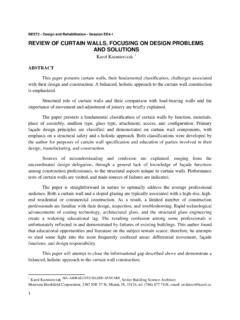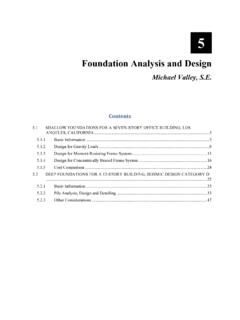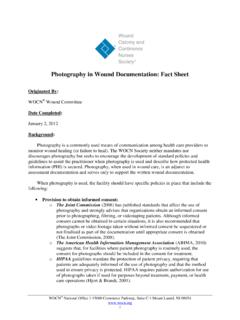Transcription of Marigolds By Eugenia W. Collier
1 -1-MarigoldsBy Eugenia W. CollierWhen I think of the hometown of my youth, allthat I seem to remember is dust the brown, crumblydust of late summer arid, sterile dust that gets intothe eyes and makes them water, gets into the throatand between the toes of bare brown feet. I don t knowwhy I should remember only the dust. Surely theremust have been lush green lawns and paved streetsunder leafy shade trees somewhere in town; butmemory is an abstract painting it does not presentthings as they are, but rather as they feel. And so,when I think of that time and that place, I rememberonly the dry September of the dirt roads and grasslessyards of the shantytown where I lived. And one otherthing I remember, another incongruency ofmemory a brilliant splash of sunny yellow against thedust Miss Lottie s Marigolds .
2 Whenever the memory of those marigoldsflashes across my mind, a strange nostalgia comeswith it and remains long after the picture has faded. Ifeel again the chaotic emotions of adolescence,illusive as smoke, yet as real as the potted geraniumbefore me now. Joy and rage and wild animalgladness and shame become tangled together in themulticolored skein of fourteen-going-on-fifteen as Irecall that devastating moment when I was suddenlymore woman than child, years ago in Miss Lottie syard. I think of those Marigolds at the strangest times; Iremember them vividly now as I desperately passaway the time. I suppose that futile waiting was the sorrowfulbackground music of our impoverished littlecommunity when I was young. The Depression thatgripped the nation was no new thing to us, for theblack workers of rural Maryland had always beendepressed.
3 I don t know what it was that we werewaiting for; certainly not for the prosperity that was just around the corner, for those were white folks words, which we never believed. Nor did we wait forhard work and thrift to pay off in shining success, asthe American Dream promised, for we knew betterthan that, too. Perhaps we waited for a miracle,amorphous in concept but necessary if one were tohave the grit to rise before dawn each day and labor inthe white man s vineyard until after dark, or to wanderabout in the September dust offering one s sweat inreturn for some meager share of bread. But God waschary with miracles in those days, and so wewaited and waited. We children, of course, were only vaguelyaware of the extent of our poverty. Having no radios,few newspapers, and no magazines, we weresomewhat unaware of the world outside ourcommunity.
4 Nowadays we would be called culturallydeprived and people would write books and holdconferences about us. In those days everybody weknew was just as hungry and ill clad as we was the cage in which we all were trapped,and our hatred of it was still the vague, undirectedrestlessness of the zoo-bred flamingo who knows thatnature created him to fly free. incongruency: inconsistency; lack of agreement orharmonymulticolored skein: The writer is comparing her manyfeelings to a skein, or long coiled piece of manycolored : vague, : not generous. As I think of those days I feel most poignantlythe tag end of summer, the bright, dry times when webegan to have a sense of shortening days and theimminence of the cold. By the time I was fourteen, my brother Joeyand I were the only children left at our house, the olderones having left home for early marriage or the lure ofthe city, and the two babies having been sent torelatives who might care for them better than we.
5 Joeywas three years younger than I, and a boy, andtherefore vastly inferior. Each morning our mother andfather trudged wearily down the dirt road and aroundthe bend, she to her domestic job, he to his dailyunsuccessful quest for work. After our few choresaround the tumbledown shanty, Joey and I were freeto run wild in the sun with other children similarlysituated. For the most part, those days are ill-defined inmy memory, running together and combining like afresh watercolor painting left out in the rain. Iremember squatting in the road drawing a picture inthe dust, a picture which Joey gleefully erased withone sweep of his dirty foot. I remember fishing forminnows in a muddy creek and watching sadly as theyeluded my cupped hands, while Joey laugheduproariously.
6 And I remember, that year, a strangerestlessness of body and of spirit, a feeling thatsomething old and familiar was ending, and somethingunknown and therefore terrifying was One day returns to me with special clarity forsome reason, perhaps because it was the beginning ofthe experience that in some inexplicable way markedthe end of innocence. I was loafing under the greatoak tree in our yard, deep in some reverie which Ihave now forgotten, except that it involved somesecret, secret thoughts of one of the Harris boysacross the yard. Joey and a bunch of kids were borednow with the old tire suspended from an oak limb,which had kept them entertained for a while. Hey, Lizabeth, Joey yelled. He never talkedwhen he could yell. Hey, Lizabeth, let s gosomewhere.
7 I came reluctantly from my private world. Where you want to go? What you want to do? The truth was that we were becoming tired ofthe formlessness of our summer days. The idlenesswhose prospect had seemed so beautiful during thebusy days of spring now had degenerated to an almostdesperate effort to fill up the empty midday hours. Let s go see can we find some locusts on thehill, someone suggested. Joey was scornful. Ain t no more locusts all got em all while they was still green. The argument that followed was brief and notreally worth the effort. Hunting locust trees wasn t funanymore by now. Tell you what, said Joey finally, his eyessparkling. Let s us go over to Miss Lottie s.
8 Clarity: n.: : not explainable or understandable. The idea caught on at once, for annoying MissLottie was always fun. I was still child enough toscamper along with the group over rickety fences andthrough bushes that tore our already raggedy clothes,back to where Miss Lottie lived. I think now that wemust have made a tragicomic spectacle, five or sixkids of different ages, each of us clad in only onegarment the girls in faded dresses that were too longor too short, the boys in patchy pants, their sweatybrown chests gleaming in the hot sun. A little cloud ofdust followed our thin legs and bare feet as wetramped over the barren land. When Miss Lottie s house came into view westopped, ostensibly to plan our strategy, but actuallyto reinforce our courage.
9 Miss Lottie s house was themost ramshackle of all our ramshackle homes. Thesun and rain had long since faded its rickety framesiding from white to a sullen gray. The boardsthemselves seemed to remain upright not from beingnailed together but rather from leaning together, like ahouse that a child might have constructed from brisk wind might have blown it down, and the factthat it was still standing implied a kind of enchantmentthat was stronger than the elements. There it stoodand as far as I know is standing yet a gray, rottingthing with no porch, no shutters, no steps, set on acramped lot with no grass , not even any weeds amonument to decay. In front of the house in a squeaky rocking chairsat Miss Lottie s son, John Burke, completing theimpression of decay.
10 John Burke was what was knownas queer-headed. Black and ageless, he sat rockingday in and day out in a mindless stupor, lulled by themonotonous squeak-squawk of the chair. A batteredhat atop his shaggy head shaded him from the John Burke was totally unaware of everythingoutside his quiet dream world. But if you disturbed him,if you intruded upon his fantasies, he would becomeenraged, strike out at you, and curse at you in somestrange enchanted language which only he couldunderstand. We children made a game of thinking ofways to disturb John Burke and then to elude hisviolent retribution. But our real fun and our real fear lay in MissLottie herself. Miss Lottie seemed to be at least ahundred years old. Her big frame still held traces of thetall, powerful woman she must have been in youth,although it was now bent and drawn.










